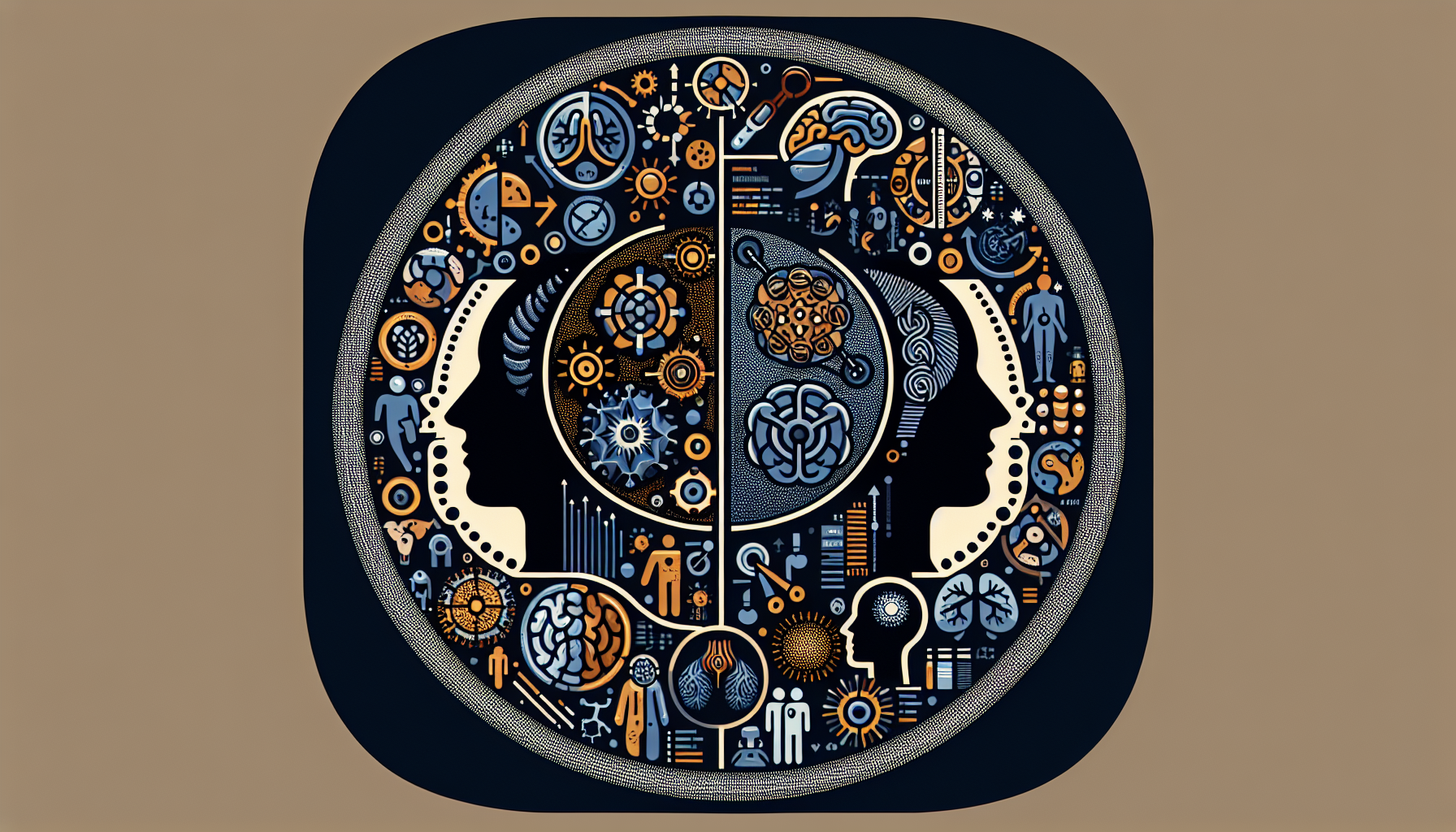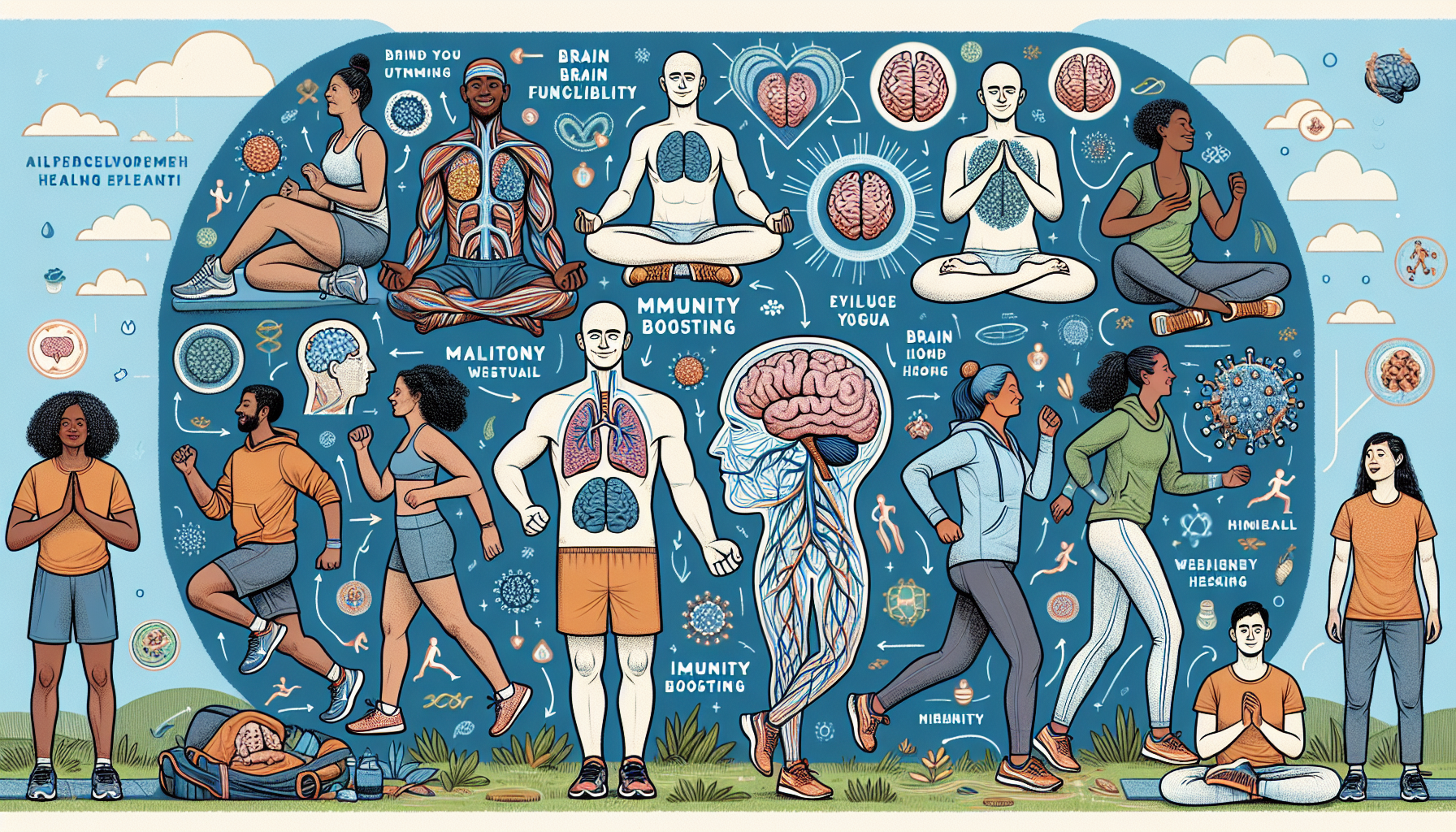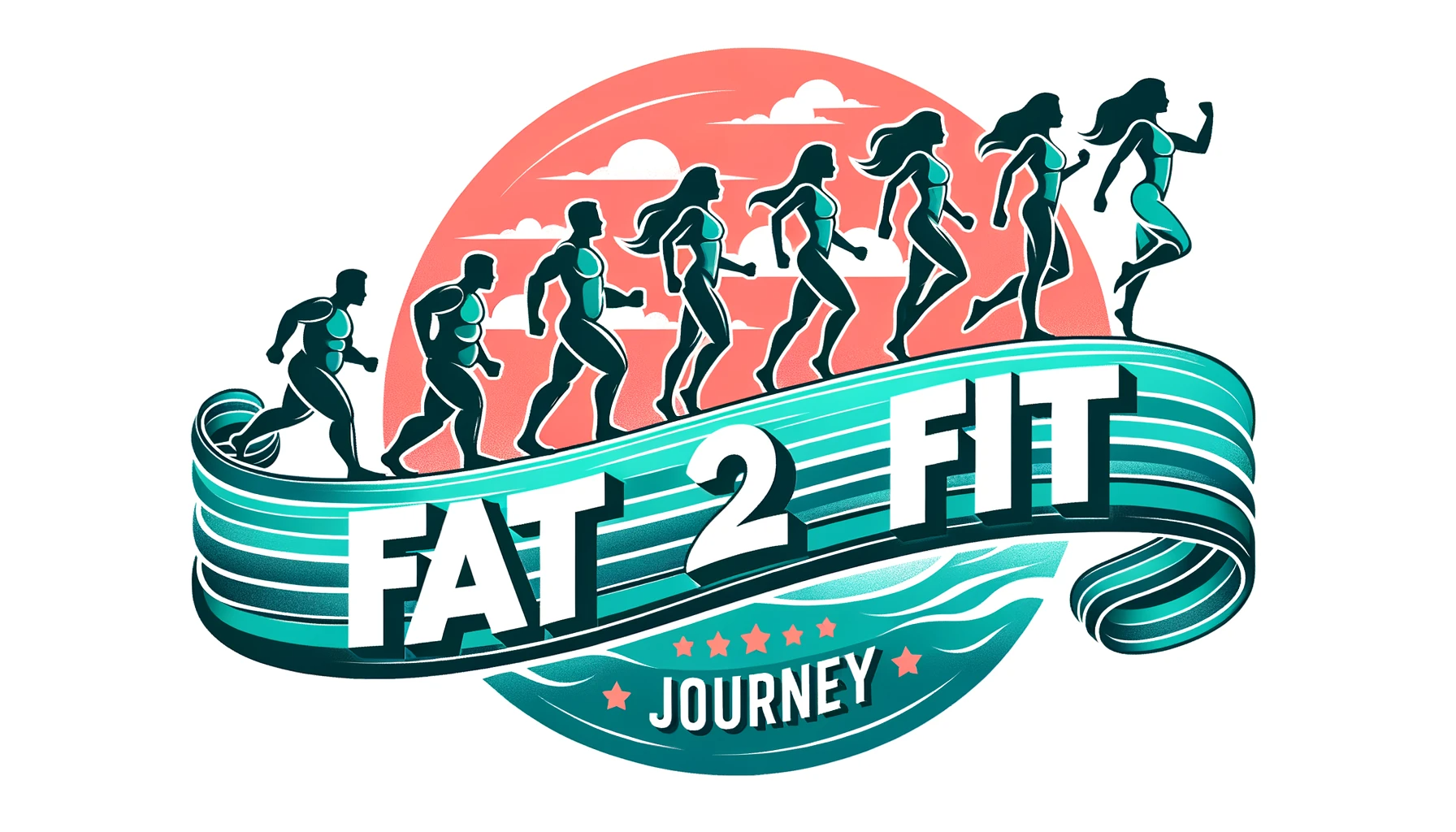In today’s fast-paced world, it’s important to take a step back and prioritize our mental health. But did you know that our mental well-being is closely tied to our physical well-being? From reducing stress levels to improving sleep quality, taking care of our mental health can have a profound impact on our overall wellness. In this article, we will explore the connection between mental and physical health, and discover simple yet effective strategies to promote a healthier mind and body.

Table of Contents
The Importance of Mental Health
Mental health plays a pivotal role in our overall well-being. It not only affects our emotional state but also has a significant impact on our physical health. Understanding the link between mental and physical health is crucial for maintaining a balanced and healthy lifestyle.
The Link Between Mental and Physical Health
The Role of Stress in Physical Health
Stress is a common factor that influences both mental and physical well-being. When we experience stress, our body releases stress hormones such as cortisol, which can have detrimental effects on our physical health. Prolonged exposure to stress can lead to a weakened immune system, high blood pressure, and an increased risk of cardiovascular diseases.
Impact of Mental Health Disorders on Physical Well-being
Mental health disorders can have a profound impact on physical well-being. Conditions such as depression and anxiety can manifest not only in emotional symptoms but also in physical symptoms such as headaches, stomachaches, and muscle tension. Moreover, individuals with mental health disorders may be more prone to engaging in unhealthy behaviors such as substance abuse or poor diet, further compromising their physical health.
The Effects of Exercise on Mental Health and Physical Well-being
exercise not only benefits our physical health but also has a positive impact on our mental well-being. Engaging in regular physical activity stimulates the release of endorphins, which are often referred to as the “feel-good” hormones. Endorphins help alleviate symptoms of stress, anxiety, and depression, promoting a sense of well-being. Additionally, exercise improves our self-esteem and body image, further boosting our mental health.
Understanding the Mind-Body Connection
The mind-body connection refers to the intricate relationship between our mental and physical states. It highlights how our thoughts, emotions, and behaviors can influence our physical health, and vice versa. Recognizing this connection is essential for achieving overall wellness.
The Role of Neurotransmitters in Mental and Physical Health
Dopamine and its Impact on Mood and Physical Health
Dopamine is a neurotransmitter that plays a crucial role in regulating our mood and emotions. It is often associated with feelings of pleasure and reward. Imbalances in dopamine levels can result in mental health disorders such as depression and addiction. Furthermore, dopamine is also involved in coordinating movement and motor functions, highlighting its significance for physical health.
Serotonin: The Mood Regulator
Serotonin is another neurotransmitter that affects our mood, sleep, appetite, and cognitive functions. Deficiencies in serotonin have been linked to conditions such as depression and anxiety. Ensuring optimal serotonin levels is vital for maintaining mental and physical well-being.
Endorphins and their Effects on Mental Health and Physical Well-being
Endorphins are chemical messengers produced by the body that help alleviate pain and induce feelings of pleasure and happiness. These “natural painkillers” are released during exercise, leading to improved mood, reduced stress levels, and increased overall well-being. The impact of endorphins on mental and physical health highlights the importance of engaging in activities that promote their release.

Stress: The Silent Killer
The Relationship Between Chronic Stress and Physical Well-being
Chronic stress can have severe implications for our physical health. Being in a constant state of stress can lead to chronic inflammation, which contributes to the development of various health conditions including heart disease, diabetes, and autoimmune disorders. Managing and reducing stress is crucial for maintaining optimal physical well-being.
Effects of Stress on Mental Health
Stress has a significant impact on mental health, often triggering or exacerbating symptoms of anxiety and depression. It can also impair cognitive function, leading to difficulties in concentration and decision-making. Recognizing the effects of stress on mental health is vital for implementing effective coping mechanisms.
Coping Mechanisms for Managing Stress and Improving Mental and Physical Health
Implementing healthy coping mechanisms is essential for managing stress and improving mental and physical well-being. These can include activities such as practicing mindfulness and meditation, participating in hobbies and activities that bring joy, seeking social support, and engaging in regular exercise. It is important to find coping strategies that work best for you and prioritize self-care.
Adverse Childhood Experiences and Long-term Health Outcomes
The Impact of Trauma on Mental Health and Physical Well-being
Adverse childhood experiences, such as physical or emotional abuse, neglect, or household dysfunction, can have long-lasting effects on mental and physical health. Trauma experienced during childhood can significantly increase the risk of developing mental health disorders and chronic illnesses later in life. Recognizing the impact of childhood trauma is essential for providing appropriate support and intervention.
Exposure to Childhood Adversity and Increased Risk of Chronic Diseases
Children who experience adverse childhood experiences are more likely to develop chronic diseases in adulthood. These can include cardiovascular diseases, obesity, diabetes, and mental health disorders such as depression and anxiety. Addressing childhood adversity and providing early intervention can help minimize the long-term effects on health.
Strategies for Healing and Minimizing Long-term Effects on Health
Healing from childhood trauma requires a multifaceted approach that encompasses therapeutic interventions, social support, and self-care practices. Therapy, counseling, and support groups can help individuals process and heal from trauma. Additionally, implementing healthy lifestyle choices, such as regular exercise, a balanced diet, and adequate sleep, can contribute to minimizing the long-term effects of childhood adversity.

The Benefits of Therapy and Counseling
Therapy as a Tool for Addressing Mental Health Challenges
Therapy provides a safe and supportive environment for individuals to explore and address their mental health challenges. Through various therapeutic techniques, individuals can gain insights into their thoughts, emotions, and behaviors, and develop healthier coping mechanisms. Therapy plays a vital role in promoting mental and emotional well-being.
Types of Therapies Beneficial for Mental and Physical Well-being
There are numerous types of therapies available that can be beneficial for promoting both mental and physical well-being. Cognitive-behavioral therapy (CBT) focuses on identifying and challenging negative thought patterns and behaviors, while dialectical behavior therapy (DBT) emphasizes regulating emotions and improving interpersonal skills. Other types of therapies include mindfulness-based therapies, art therapy, and music therapy, among many others. Exploring different therapy options can help individuals find the approach that resonates best with them.
The Role of Counseling in Preventative Care
Counseling can play a crucial role in preventative care, as it helps individuals develop the skills and strategies necessary to maintain optimal mental and physical health. Regular counseling sessions allow individuals to check in with their mental and emotional well-being, address any concerns or challenges, and learn effective self-care techniques. Counseling can provide invaluable support in promoting overall wellness.
Nutrition: Fueling the Mind and Body
The Relationship Between Diet and Mental Health
The food we consume has a direct impact on our mental health. Diets rich in processed foods, refined sugars, and unhealthy fats have been linked to an increased risk of mental health disorders such as depression and anxiety. On the other hand, a balanced diet consisting of fruits, vegetables, whole grains, and lean proteins provides essential nutrients that support brain function and emotional well-being.
Nutrients that Support Brain Function and Emotional Well-being
Certain nutrients are particularly beneficial for brain function and emotional well-being. Omega-3 fatty acids, found in fatty fish, flaxseeds, and walnuts, have been shown to reduce symptoms of depression and improve cognitive function. B vitamins, including folate and vitamin B12, are essential for maintaining healthy neurotransmitter levels. Additionally, antioxidants found in fruits and vegetables help protect the brain from oxidative stress.
The Impact of Gut Health on Mental and Physical Well-being
Emerging research has highlighted the crucial role that gut health plays in mental and physical well-being. The gut-brain axis, a bidirectional communication pathway between the gut and the brain, influences mood, behavior, and overall mental health. Maintaining a healthy gut microbiome through a diet rich in fiber, fermented foods, and probiotics can positively impact mental health and improve overall well-being.

Sleep: The Foundation of Mental and Physical Well-being
Sleep Deprivation and its Effects on Mental Health
Adequate sleep is essential for maintaining optimal mental health. Sleep deprivation can contribute to the development of mental health disorders such as depression and anxiety. Lack of sleep impacts our mood, cognitive function, and ability to cope with stress. Prioritizing quality sleep is crucial for supporting mental well-being.
How Quality Sleep Promotes Physical Well-being
Quality sleep not only benefits mental health but also plays a vital role in supporting physical well-being. During sleep, our body repairs and restores itself, strengthening the immune system and promoting overall wellness. Sufficient sleep has been associated with a reduced risk of chronic conditions such as obesity, heart disease, and diabetes.
Improving Sleep Hygiene for Better Mental and Physical Health
Establishing good sleep hygiene practices is essential for better mental and physical health. These practices include maintaining a regular sleep schedule, creating a relaxing bedtime routine, creating a sleep-friendly environment, avoiding stimulants such as caffeine, and engaging in relaxation techniques such as meditation or deep breathing exercises. Prioritizing sleep hygiene can significantly improve overall well-being.
Conclusion
As we have explored, mental health and physical health are deeply interconnected. Understanding this connection and prioritizing mental well-being is crucial for achieving optimal physical health. By recognizing the impact of stress, childhood experiences, and nutrition on mental and physical well-being, and implementing strategies such as exercise, therapy, and adequate sleep, we can cultivate a balanced and healthy lifestyle. Mental health matters, and investing in our mental well-being is a worthwhile endeavor that yields numerous benefits for our overall health and happiness.

